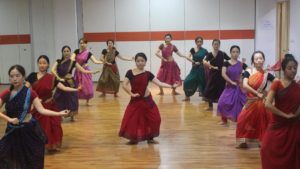Chinese Odissi dancer Wu Kan has been living in Bhubaneswar for the past five years to master the dance form at Guru Kelucharan Mohapatra’s Odissi institution ‘Srjan’. She is the first professional Odissi dancer from China to avail the prestigious Indian Council For Cultural Relations (ICCR) Scholarship to study Odissi in its land of origin.
Excerpts from an interview:
What provoked a young and successful Chinese woman, the only daughter of her parents, to quit the security of her home and a job with an international company and even skip marriage to land in the alien land of India?
Certain answers can’t be explained in words. Maybe it was God’s grant of my only wish to be in India. India’s culture fascinated me the most, especially its dance and music, and hence I always longed to live here for more years.
Where did you grow up in China and what was your profession before you arrived in India?
I was born in Hangzhou, the capital city of Zhejiang province in east China. It is one of the most prosperous cities in China, famous for its top quality green tea and silk products. Hangzhou has historically been an important hub for artists and scholars. The city’s West Lake is a UNESCO World Heritage site that is among its best-known attractions. Hangzhou is awarded to host the 2022 Asian Games. It also hosted the eleventh G20 summit in 2016.
My parents were administrative officials at the university there. I graduated in Computer Science and started working in 2004. After four years, I moved to Shanghai. During the 12 years of my career in China, I worked in different fields, such as insurance, advertising, fashion design, and industrial design as Administration and HR manager.
Did you learn dance in China? How did you get interested in Indian classical dances?
I was performing and teaching Hip-hop for eight years during my high school and college days. I was always interested in Indian culture, especially Indian music and dance. In 2012, I discovered Odissi dance on the internet. But I couldn’t find any Odissi dance teacher in Shanghai. Finally, the Indian Consulate in Shanghai helped me to find two Indian classical dance teachers. So I started receiving basic training in Odissi and Bharatanatyam from them on weekends. But both the ladies went back to India just after six months as their husbands got transferred.

I was amazed by the beautiful postures and moments, the expressive eyes of the dancers, and also the mythical stories behind them. Finally, in 2014, I decided to come to India to learn Odissi at its place of origin and resigned from my job. I received a scholarship from ICCR next year and started my training at Srjan. It has been five years since then. The scholarship was over in three years and since then my training has been self-financed.
Who was the first Odissi dancer from China?
Zhang Jun was the first to learn Odissi. She is no more. Many years ago, she was sent by the Chinese Government to India to learn Kathak, Odissi, Bharatanatyam, Mohiniyattam, and Chhau and then return to China to teach.
What was your childhood dream-career?
When I was a child, there was a TV show that used to be my favourite. In each episode, the anchor would travel to a foreign country, introduce its natural beauty and unique culture to Chinese audiences. That anchor’s job is probably my first childhood dream career that I can remember.
How has been your experience in and impression of Odisha so far?
Life in Odisha is simple and quiet, that is what I love the most about it. I feel more connected with nature here. It is a place where I could find inner peace and fully concentrate on my studies.
Odia people are very humble, polite, and kind. Odisha society is a bit more conservative compared to many other parts of India. Over the years, I’ve picked up a few Odia words and simple sentences for basic communication. Chennapoda has been my most favourite Odia food.
As an Odissi dancer, learning about Lord Jagannath is essential. Many times, I visited Puri and I was very lucky to join Ratha Yatra in 2016 and 2017 for the darshan of Lord Jagannath. The devotion of the Odia people towards Lord Jagannath has deeply moved me. It has really helped me to understand the close connection between God and the dance and the bhakti emotion in it.
How much do you miss China by being in India?
I miss my parents and my friends a lot. But thanks to modern technology, phone and video calls help me stay connected. What I miss most is definitely Chinese food.
What is your future plan for your career as an Odissi dancer?
I was planning to go back to China this year to start teaching and performing Odissi there. I wished to share and introduce this beautiful dance form to more audiences in China. I planned to come back to Bhubaneswar at regular intervals to spend a few months here and continue my study of Odissi to improve further as learning Indian classical dance is a never-ending process. However, due to the pandemic, my plan had to be postponed and I could not return to China.
Did you feel insecure when the relationship between India and China was tense recently?
Yes, especially when everyone was warning me not to step out of the house and not to let anyone know my nationality. It was the most horrifying and insecure time that I have ever had in my life so far.




